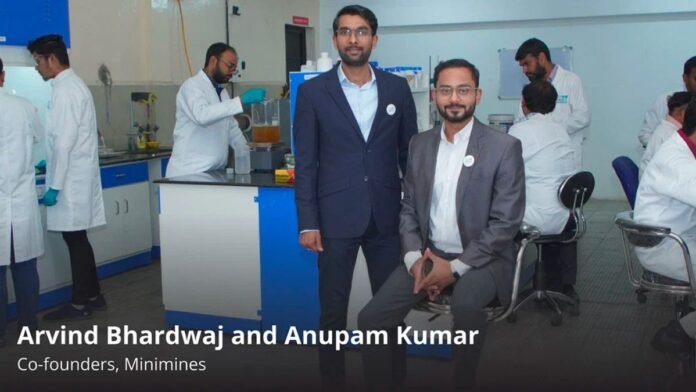Minimines claims their lithium and other precious metal battery recycling technology is cheaper and more sustainable than competitors. The company wants to improve lithium extraction in India to lower EV prices.
Electric automobiles (EVs) save money on gas and diesel over time, but the benefits take two years.
The extended wait doesn’t justify EVs’ 1.2 to 2.5-fold higher prices for most buyers.
Minimines, a Bengaluru clean tech company, promises cheaper EV prices.
EVs’ greater initial cost is due to the battery pack, mainly Chinese and South Korean lithium-ion cells. EV batteries cost up to 40%, according to industry estimates.
NITI Aayog’s infrastructure connectivity, transport, and e-mobility adviser Sudhendu Sinha said India must develop lithium-ion cells to make EVs cheaper.
India might recycle old batteries and other electrical equipment to make lithium-ion batteries as it has fewer lithium reserves than China or South Korea.
Batteries and battery components are burned by most manufacturers.
When garbage reaches recycling centers, pyrometallurgy and carbothermal processes sometimes fail to remove all metals and generate a lot of CO2.
MINIMINE offers an eco-friendly method for recycling precious metals like lithium from batteries and industrial trash.
In 2021, Anupam Kumar and Arvind Bhardwaj created a hybrid-hydrometallurgy company that claims to extract lithium and precious metals with 96% purity.
The technique is environmentally friendly because it creates no water, residue, or carbon dioxide emissions.
India generates over 70,000 tonnes of lithium-ion waste.Most disposable modern products use Li-ion batteries, including phones, laptops, and wireless headphones. Kumar added that while electric car lithium cells cost more, usable and recyclable lithium-ion waste is wasted or burned.
“We thought we could make India more self-reliant and lower the cost of electric vehicle cells and batteries by recycling all of this waste lithium ion and other precious metals,” he says.
Minimines’ extraction technology is NITI Aayog-approved. The UN Industrial Development Organization and Oil India Ltd., which gave it $500,000, audited and certified its prototype facility.
It works
Minimines’ hybrid hydrometallurgy generates 96% pure elemental lithium and other metals in three steps:
Battery or cell phone metal is extracted and prepped for the next step.
Dissolving metal salts at varying temperatures, pressures, and pH levels separates and extracts lithium, nickel, cobalt, and manganese. Reusing solvent water reduces effluent waste.
Beneficiation uses crushing, grinding, screening, washing, flotation, and other processes to concentrate essential materials.
“No liquid or solid waste or discharge during or after process. Kumar believes water is a solvent.
After extraction, these metals are sold to EV battery, lubricant, medicinal, catalyst, and metallurgical firms.
Minimines says Oil India Ltd., BIRAC, and others funds helped it expand from a pilot unit to a commercial operation. It plans to fund a full-scale facility next.
Minimines, competing with Batx Energies, Lohum, and Metastable Materials, has numerous revenue streams:
Its biggest revenue source is commodity sales from extracted resources.
License/royalty to develop extraction plants utilizing its exclusive technology elsewhere.
Minimines sells non-polluting hybrid-hydrometallurgy CER equipment to other companies.
Kumar says extraction yields $8,820 in precious metals for every $4,000.
The business seeks to help battery makers achieve their Extended Producer Responsibility (EPR), which includes disposal and recycling.
MarketsAndMarkets expects the lithium-ion battery market will grow 13.1% to $135.1 billion by 2031 from $48.6 billion in 2023.
EVs and energy storage will need lithium-ion batteries as the world moves toward sustainable electricity generation and distribution.
Conclusion:-
Bengaluru-based clean tech company Minimines wants to cut EV pricing in India by enhancing lithium extraction. EVs’ greater initial cost is due to the battery pack, especially Chinese and South Korean lithium-ion cells. EV batteries cost up to 40%, according to industry estimates. Minimines claims to have developed an eco-friendly lithium extraction and recycling method from batteries and industrial waste.
Minimines’ hybrid-hydrometallurgy method extracts lithium and other metals with 96% purity without water, residue, or carbon dioxide emissions. No liquid or solid waste is produced during or after the operation.
Most disposable modern devices employ lithium-ion waste from India, which creates around 70,000 tonnes annually. Minimines’ extraction technology is NITI Aayog-approved and UN Industrial Development Organization and Oil India Ltd.-audited. The process involves extraction, separation, and beneficiation.
Minimines competes with Batx Energies, Lohum, and Metastable Materials and sells commodities and licenses/royalty to develop extraction operations using their exclusive technology. The business assists battery manufacturers in fulfilling their Extended Producer Responsibility (EPR), which includes disposal and recycling.



